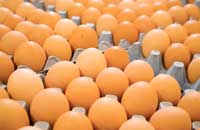Deluge of egg imports predicted after EU cage ban

There is growing evidence that the EU cage egg ban will distort the European egg market, fuelling a flood of imports of cheap eggs produced to lower welfare standards.
That is according to a new study on the impact of the ban, which was presented to delegates at the recent International Egg Commission (IEC) meeting held in Vancouver, Canada.
Respected German statistical analyst Hans-Wilhelm Windhorst warned the EU flock would continue shrinking, resulting in the EU becoming a net importer for the first time by 2012.
“Egg production in the EU declined by 2.5% from 2002 to 2007,” said Mr Windhorst.
A proportion of this decline is due to the “very critical situation” in the German egg sector which saw a dramatic decrease in the number of egg units and laying hens.
The number of layers dropped from 40m in 2002 to around 33m in 2007 and self-sufficiency in eggs fell from 70% to 55%. A further decrease of 6-7m layers is expected by the end of 2009, resulting in a growing egg deficit. On top of the 5.7bn eggs imported in 2008 another 2bn will have to be imported to meet domestic demand this year, said the report.
A large proportion of these imports are coming from The Netherlands, which has been quicker to convert its systems, explained Klaus Torborg of Lohmann Animal Health at a recent producer meeting in Shropshire.
Getting the equipment supplied in the short time available has been more of an issue with many producers looking to convert at the same time, rather than simply price or even preferred choice.
A further big influence on the industry has been the discounters, such as Aldi, Lidl and Netto, said Mr Torborg.
Discounters now account for around 47% of all eggs sold in Germany and for marketing and animal welfare reasons, they will not sell eggs from enriched cages. Therefore, most egg producers, despite high investment in enriched cages, will have to convert to the barn system,” he said.
Along with Germany, the other big loser was the UK which saw a 16.3% drop in egg production from 2002 to 2007 (see table). Prof Windhorst said the reason was the decision by some leading retailers to stop selling cage eggs.
However, two of the UK’s leading four supermarkets have declared they will sell eggs produced from enriched colonies, one will not and the remaining one is currently undecided.
Looking ahead to 2012, Prof Windhorst sees imports into the EU as inevitable. “Egg imports from countries with much lower animal welfare standards will be necessary. Nothing will be gained for the welfare of laying hens in these countries.”
Another fear is that other member states may delay the ban.
Mark Williams of the British Egg Industry Council reported at the IEC meeting that last year in Europe there were 278m hens in cage systems and only 7% of these were in enriched colonies.
This raises concerns that some member states wouldn’t be ready in time and respective governments might seek delays in implementing the rules.
There was also the prospect of other EU member states interpreting the rules differently to DEFRA and giving their respective sectors another 12 months to comply. This is by allowing hens placed into cages up to 31 December 2011 to complete their laying cycle.
